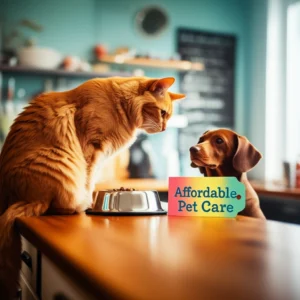Quick Answers Now
Let’s get straight to it—yes, free (and low-cost) pet care for seniors really does exist. You’re not imagining things, and it isn’t just urban myth passed quietly from neighbor to neighbor. If you, or someone you love, is struggling to pay for vet visits, medications, or even good ol’ kibble for a little furry friend, there’s real help available. The trick? Knowing where to look, who to ask, and how to catch the right programs before your savings run dry or your worry meter hits red.
Whether you’re anxious about a sudden emergency—like the cat coughs up something that looks way too complicated for Google—or wondering if there’s such a thing as free pet insurance for seniors over $50, you’re not alone. Hundreds of charities, local groups, and even some kind-hearted government folks have built a safety net for animal-loving seniors. So take a breath, make sure that tail is wagging (or at least the purr is steady), and let’s find out how to keep your companion healthy and close without breaking the bank.
Why It Matters
Pets aren’t just cute. For seniors, they can be actual lifesavers—a reason to move, a reason to laugh, or sometimes just a reason to wake up feeling a little more like yourself. Science backs this up, but honestly, who needs a study when you know the warmth of a cat curled on your lap, or the thrill in your heart when a dog greets you like a rock star just for coming home?
But it’s not all sunshine and whiskers—there’s a flip side. Vet bills creep up. Your back isn’t what it used to be. Sometimes, the very love you depend on can become a stressful weight when money is tight. That’s why understanding both the joys and the “oh no” moments is important—you want the love, not the looming bills.
Real Benefits Of Pets
Let’s get a little sentimental for a second. A pet doesn’t care about your wrinkles or your tax bracket. They just stick by you. For many seniors, that means:
- Less loneliness, less depression, and more routine when everything else feels out of control.
- Physical movement—walking the dog or even just cleaning the litter box counts. It keeps you on your feet, keeps the blood moving.
- Mental sharpness. Having a creature depend on you can keep your mind a little brighter and your heart a little softer.
For those with disabilities, service and companion animals can literally bridge the gap between isolation and independence. There are even exemptions and special protections for folks whose pets help manage medical conditions—a win for both the body and the soul.
The Not‑So‑Fun Side
Alright, story time. I had an older neighbor, “Gramps” we all called him, who’d sneak table scraps to his mutt, Rocky. All was well, until one midnight, Rocky’s yelps sent panic through Gramps’ apartment. That emergency vet bill? Ugly. And when you’re on a fixed income, those numbers—tests, shots, prescriptions—climb higher than you’d expect.
So, here’s reality: even the sweetest pet will eventually get sick or need shots, and unexpected accidents can cost hundreds—or thousands. You shouldn’t have to go without groceries or put off your own meds just to keep a pet healthy. And if rehoming ever crosses your mind, know you’re not alone, and no shame, but there are other ways to get help before it comes to that.
Types Of Free (And Low‑Cost) Help
Now, onto the juicy part: the help. There’s a patchwork of programs out there, and you might have to play a little detective, but snagging support isn’t impossible. Let’s break it down:
Charities And Nonprofits
Groups like the Farley Foundation and PAWS Canada are in the game purely for the love of the human–animal bond. The Farley Foundation, for example, steps in for seniors who can’t afford surprise vet bills. They’ve saved pets—and the hearts of their owners—again and again. According to their records, they’ve helped thousands of seniors and folks with disabilities across Ontario[4]. You won’t get a blank check, but for urgent surgeries, medications, and check-ups, it’s a lifeline.
PAWS Canada, much the same, provides subsidies for essential care, vaccines, spay/neuter, and can even help with emergencies if you find yourself in a real pinch. And yes, these programs exist because, let’s be honest, nobody should have to choose between groceries and catnip.
Community Programs
Think local: your city’s animal services, senior centers, even Meals on Wheels programs (in some areas) deliver pet food and supplies right to your door, especially if you’re housebound[2]. Sometimes, there’s a registry step—just call and ask. Many food banks also stock dog and cat supplies these days. In Toronto, city resources also offer emergency care plans and supply help for pet parents in crisis according to official community services[1].
For those facing housing instability, some city shelters offer emergency vet care for free in partnership with local humane societies. They even cover things like spay/neuter, shots, microchips, flea control, and sometimes food, leashes, or crates if you’re in urgent need, no matter your age.
Low‑Cost Clinics & Vets
Not everything can be free (sorry, I wish!), but plenty of nonprofits keep costs super low. Take East Village Animal Hospital—great folks, clear mission. They cater to seniors, low-income families, rescue groups, and the kind of pet lovers who might be a bit thin in the wallet this month. Expect to pay less for basics like shots and checkups, sometimes as much as half what private clinics charge[4]. Pro tip: book in advance, and note these clinics don’t cover breeders or cosmetic surgeries (you’d be surprised what people ask for!).
Emergency And Crisis Care
Sudden drama? Don’t panic. Lots of vets know about special grants or short-term help, especially for emergencies or unexpected illnesses. Ask directly—some will even file the paperwork for you if you meet the right criteria (often proof of low income or senior status). Even if one group says no, ask for referrals—they usually know who’s helping in the area.
Insurance—Is Free Real?
This is where marketing buzz meets cold truth. There isn’t “free pet insurance for seniors over $50” in the sense of zero monthly cost, but certain charities and member programs can cover a year or two if you adopt a rescue as a senior, or they’ll pay critical bills if you hit hardships.
If you want more details about what’s covered, try your luck with free pet insurance for seniors over $50 or compare options at best free pet insurance for senior citizens. More realistically, actual pet insurance plans will have monthly fees, though sometimes at a discounted rate for retired folks. Don’t forget: socking a few bucks away per month in a pet fund—or exploring vet financing/pet credit cards—is often just as good in the long run if monthly bills feel like a stretch[4].
Simple Guide To Finding Help
Step 1: Ask Your Vet
First thing, don’t be shy—good vets will know local programs and might even fill out a grant application for you (usually with proof of government assistance or a pension slip[4]). If you hit a wall, ask about payment plans or empathetic pricing. Some clinics have sliding scales, especially for the golden-agers among us.
Step 2: Search Local Listings
Dial 211 or check your city’s services page. Animal control, humane societies, and social workers often have a one-pager with all the pet programs in your area. If you’re online, just search for “pet assistance + your city,” or—old school—pop into your community center or senior group and ask around. Sometimes, word-of-mouth is the fastest search engine.
Step 3: Apply For Charity Support
Charities will typically ask for paperwork (proof of income, sometimes proof you’re over 65, or your pet’s latest vaccination). Be honest and persistent. If you don’t qualify for one group, the staff often know who might help. Just getting on someone’s call-back list can make all the difference in a pinch.
Step 4: Try Low‑Cost Clinics Or Mobiles
Mobile vet clinics—think of them as pet-care on wheels—are popping up everywhere. They’re especially handy for folks with mobility issues, and often base themselves at senior centers, community events, or even church parking lots. Services are usually limited to basics (shots, microchipping, spay/neuter). Be ready for a line, but it’s worth it.
Step 5: Prepare For The Unexpected
Have a “what if” folder. Write down pet meds, vet info, your chosen emergency contact, and a quick care guide in case you’re suddenly out of action and a friend needs to step in. Two weeks’ food and meds in a safe place is smart insurance, too.
What Subsidies Really Cover
It’s easy to daydream, but let’s keep it real. Most grant programs target preventive care (shots, spay/neuter, yearly checkups) and emergency/urgent treatments—broken bones, sudden illness, nasty infections. Few will pay for breeding, cosmetic tweaks, or “luxury” care. There’s often a co-pay, so know in advance if you’ll need to chip in—even $20 can get the wheels turning if you meet the eligibility bar[4].
| Eligibility Criteria | Commonly Covered Services | What’s Not Covered |
|---|---|---|
| Senior receiving GIS, ODSP, disability pension, or low income | Vaccines, spay/neuter, urgent medical care, routine exams, basic meds | Breeding, cosmetic procedures, non-essential treatments |
| Emergency or crisis (shelter resident, fleeing violence, homeless) | Surgery, illness treatment, preventive care, emergency housing for pets | Optional or elective procedures, supplies beyond basics |
Stories That Matter
You want a story? How about this—Theresa, a retired nurse in Sudbury, lost her husband and found herself without much but the company of Max, a seventeen-pound ginger tabby. When Max fell sick, the vet bill could’ve wiped out Theresa’s pantry. But a chatty receptionist at the clinic introduced her to a subsidy program. Three forms later, and a bit of hope, Max was getting his treatment—paid for by strangers who care a lot more than you’d think. Max recovered, and Theresa never had to sacrifice scrambled eggs or dignity to pay for his vet visit. It’s stories like these that prove the system can work, even if you need to be a bit persistent (and a little brave) to ask for help.
Smart Ways To Save
There are a few “pro moves” I’ve learned—some the hard way:
- Prevention isn’t just a buzzword. Yearly checkups, keeping up with shots and flea meds, and good dental habits are way cheaper than treating disease later on.
- Pet food pantries or local programs can help with supplies—especially if grocery bills are tight one month.
- Check if your neighbor, grandkid, or local volunteer could help walk the dog or drive you to a low-cost clinic. Often, you just need to ask.
- Have a backup “pet parent” arrangement. If you’re suddenly hospitalized, a quick note or care plan can mean your buddy is safe and fed.
Trustworthy Resources To Bookmark
If you want official info (because hey, not everything is word-of-mouth), check out the websites for Farley Foundation, PAWS Canada, or municipal animal services—these are the folks who really know their stuff. According to Pawlicy Advisor’s 2025 guide, these resources are well-documented, frequently updated, and packed with actionable advice. Animal control, public libraries, and social service lines (like 211 in most areas) are great starting points, too. And for an honest look at insurance and what kind of “free” really exists, check out options at best free pet insurance for senior citizens.
Final Thoughts And Encouragement
Sometimes it feels like everything costs more than it should and kindness is harder to find than a lost set of glasses. But I promise, communities want seniors and their pets to stick together. You don’t have to let fear of vet bills or supply costs come between you and the wagging tail, the gentle purr, or the soft weight of a warm head on your knee.
So take that first step—call your vet, check your city’s pet programs, talk to a local senior support group, or poke around online (and yep, follow some of the links here). You don’t have to do it alone. And when you figure out a trick or find a resource that saves the day, don’t keep it a secret. Share it with your circle. Who knows who needs just the encouragement you can give?
Have more questions, looking for support, or just want to swap stories about the world’s weirdest cats? Reach out to your local community, and remember—you and your pets deserve care, love, and a whole lot less stress this year. Stay cozy, stay curious, and give your furball a hug from me.













